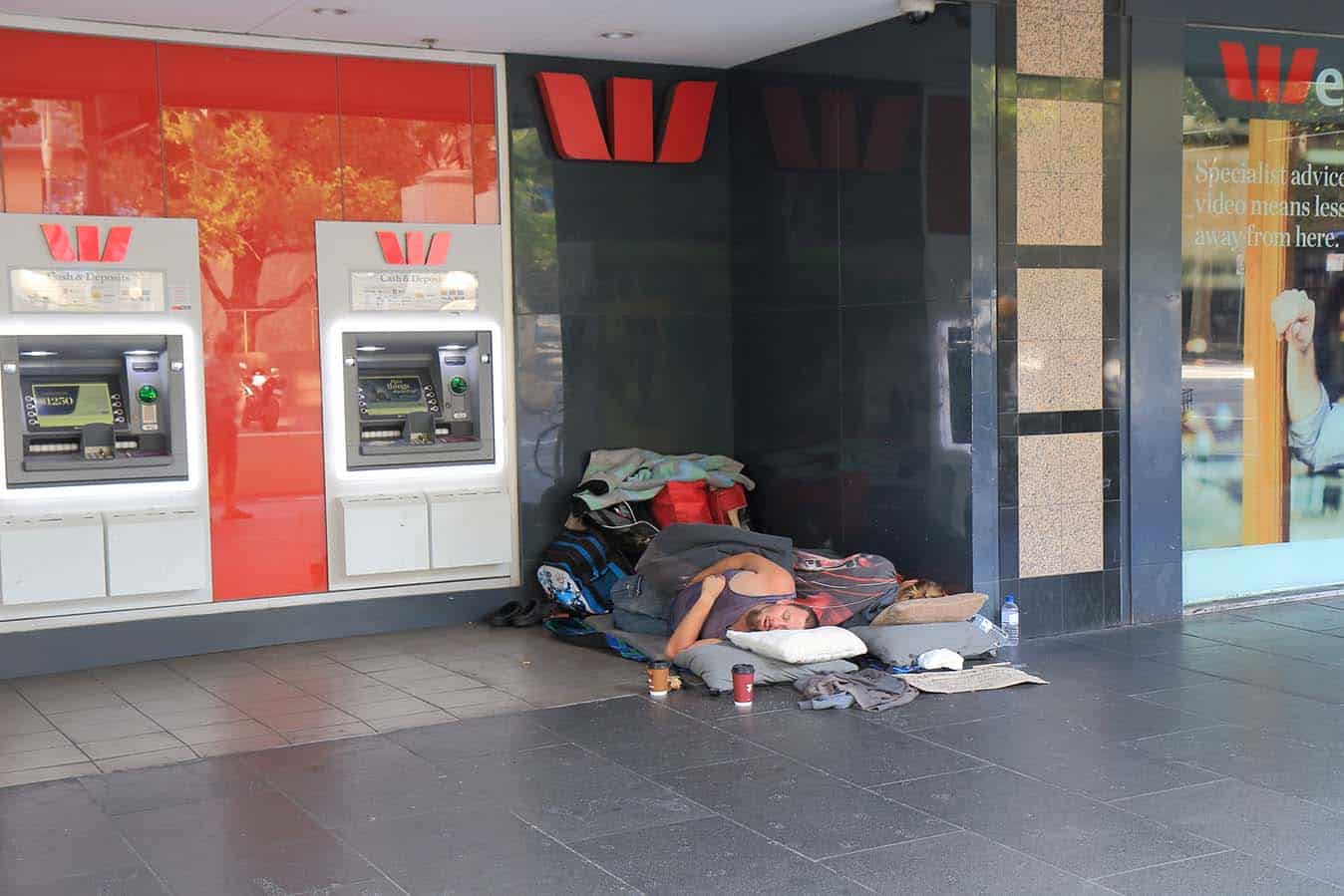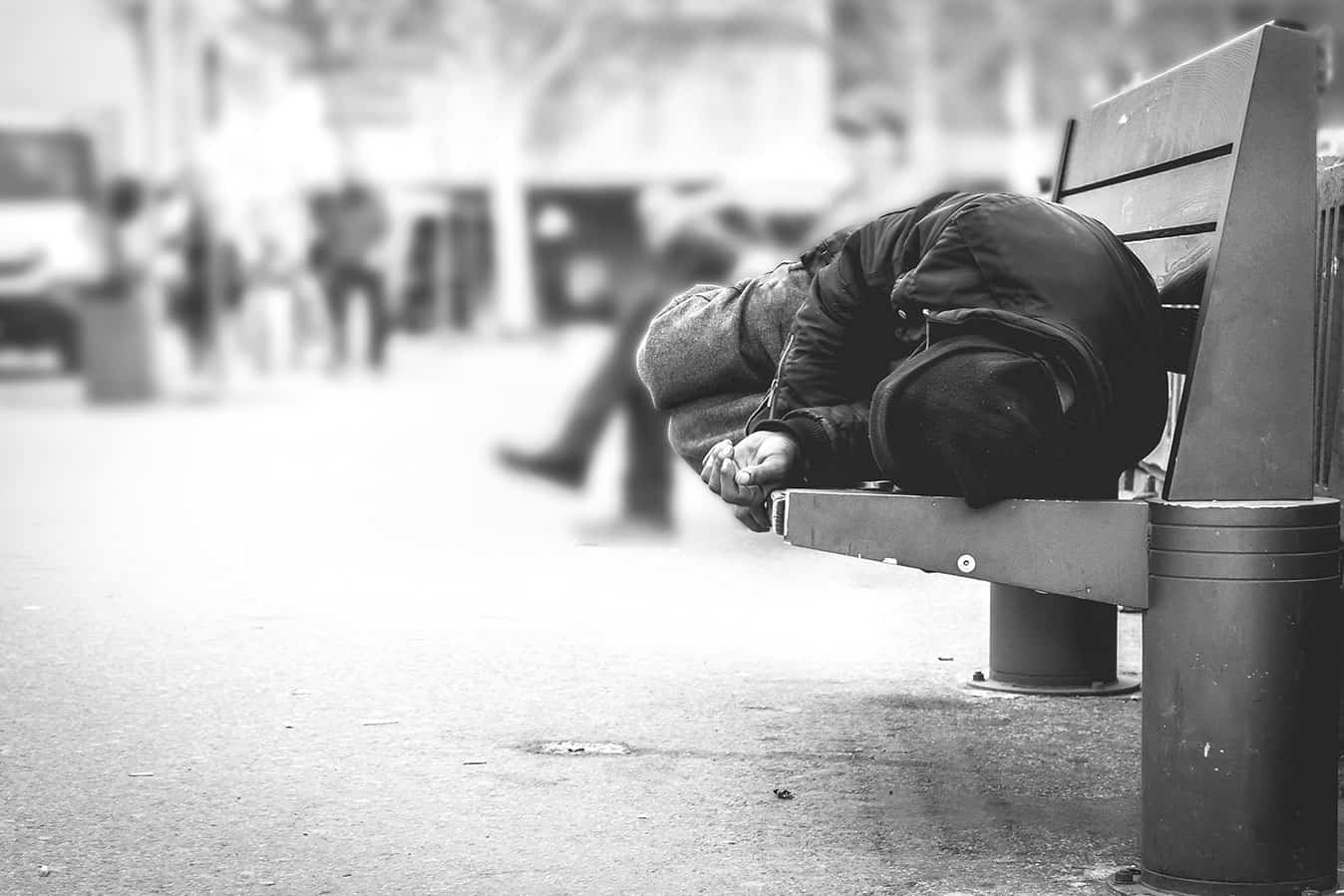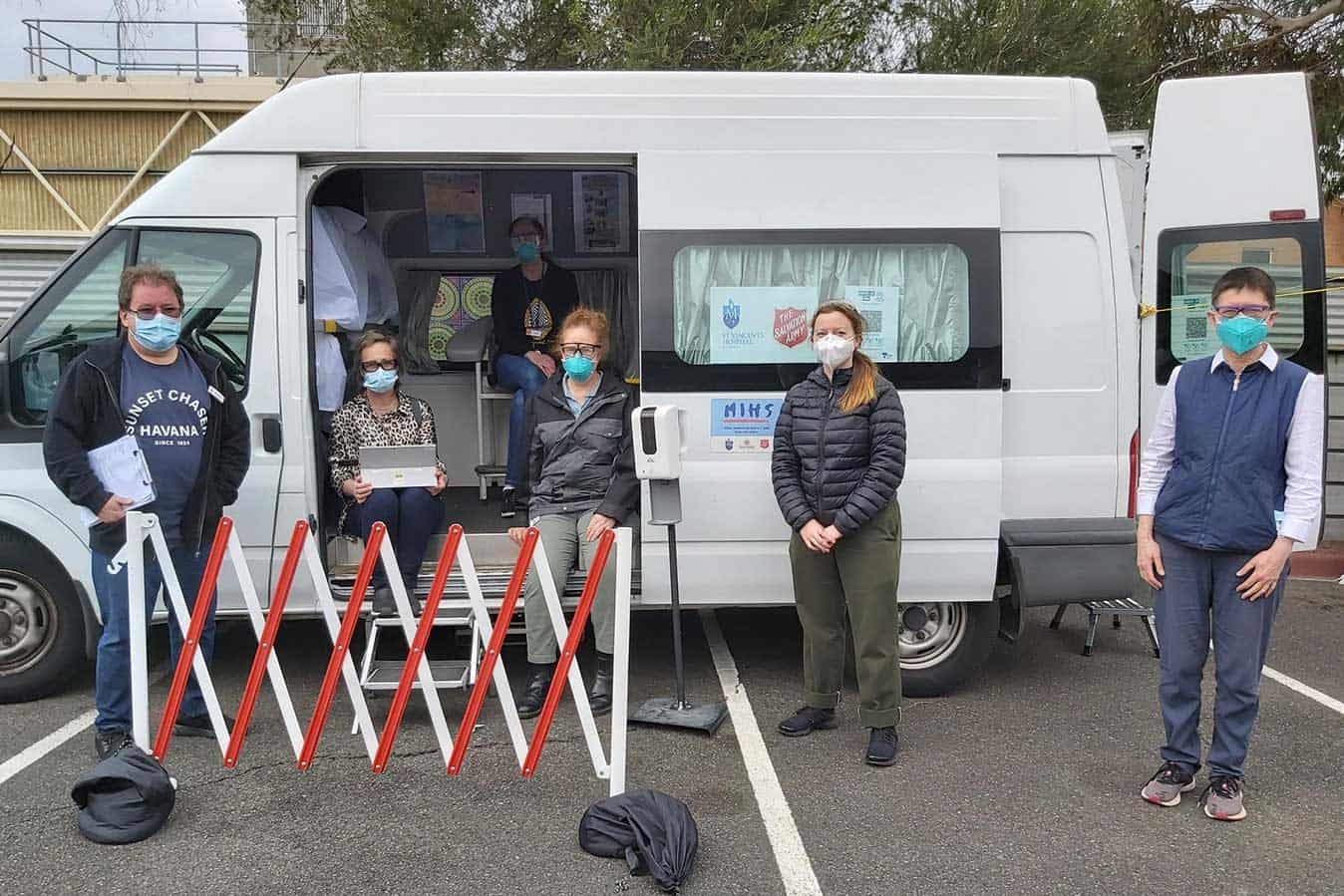“For most of us, we just get online and book an appointment with our GP or we drive down to the local hub and get a vaccine,” says community health nurse Karyn Gellie.
Victoria’s at-risk homeless population, however, have faced a number of barriers in accessing COVID-19 vaccines.
For example, many do not have the transport, particularly those living in outer suburbs, to get to vaccination hubs. Many have some level of disability and some can struggle with health literacy. Some do not even have a Medicare card.
Earlier this year, Bolton Clarke’s Homeless Persons Program teamed up with the Burnet Institute, St Vincent’s Hospital Melbourne and the Salvation Army’s Access Health Program to help vaccinate the homeless amid the escalating COVID-19 pandemic.
The Burnet Institute’s Mobile Immunisation Health and Harm Reduction Service, Salvation Army Access Health, with St Vincent’s Immunisation Nurses, afforded the ability to drive around Melbourne visiting emergency accommodation, homeless services, and drop-in-centres.
An equally important piece of the puzzle, HPP nurses tapped into their knowledge of the streets and clients to promote and support homeless people getting vaccinated against COVID-19.
HPP nurses assertively outreach to people, visiting where homeless people live and gather, such as crisis accommodation, on the streets, in parks, or boarding houses. The aim is to reach people with complex health issues who are not generally engaged with mainstream health services.

Team Coordinator Karyn says HPP nurses are often the first point of contact for homeless people with the healthcare system. That trust, built-up over many years, has proved crucial in this year’s effort to vaccinate the homeless.
HPP nurses have not been directly administering vaccinations but rather acting as middlemen and advocates for vaccination.
“The thing that our nurses have is that local knowledge,” Karyn says.
“They also have the trust of the clients, because we’re very visible in the community. We’ve been able to leverage that trust to get people vaccinated and have supported that to happen with our local knowledge of where the cohort is in the community.”
According to Karyn, HPP nurses have tried “anything and everything” to encourage the homeless to get jabbed.
Many nurses have helped people book appointments for people and organised transport for them to get there. In some cases, nurses have taken a group of people to vaccination hubs.
Working in partnership with the MIHS, nurses have crucially been able to help coordinate visits to various local communities across Melbourne where homeless people stay.
In one case, a HPP nurse organised the bus to head out to Melbourne’s outer east to several large rooming houses where young people, who aren’t typically going to visit a GP to get vaccinated, live.
For the most part, Karyn suggests Victoria’s homeless population has been ready and willing to get vaccinated. Nevertheless, lack of access proved a major barrier, at least early on.
“Sometimes there’s a misconception about homeless people not caring about their health,” she says.
“I would say that our clients, by and large, do want to get vaccinated. They understand that is what needs to happen to keep themselves and the community safe.
“Most people want to get the vaccine; it’s been more of an access issue for them. When you provide that service in a model of care that’s appropriate for the client group, they do take up the vaccine quite readily. There will always be a few that won’t.”
As Team Coordinator, Karyn supports HPP nurses to deliver healthcare to the homeless. Like everyone, when the COVID-19 pandemic hit in early 2020, the program adapted amid significant change and ongoing lockdowns.
While the HPP program continued operating throughout the pandemic, many other homeless services, such as drop-in centres, shut their doors and moved to telephone outreach. It became a big barrier for the client group.
“A big part of our role is supporting people to access the services they need, particularly healthcare. That created challenges for people because a lot of these other services were closed and whilst they had a phone service, a lot of our clients don’t have a phone, they don’t have credit, and they find it quite difficult to navigate systems where they might need to book an appointment or get a call back.
“All these sorts of things created some inequities in IT access. A lot of people had difficulty in trying to do telehealth appointments with their GP, for example, and they needed that support from us to be able to facilitate it.”
Karyn says HPP nurses work with a cohort that experiences extreme social isolation and marginalisation. Many experience mental health issues and the COVID-19 pandemic affected their ability to access regular support services.
“For some people who were able to be accommodated in the hotels it was actually of benefit to them to have some stability for a while rather than sleeping on the streets. So there was some benefit in the short-term for some of the clients,” Karyn says.
“They [clients] were quite fearful [of COVID].I think that’s one of the thing sometimes that people assume about homeless people, that they don’t necessarily care about their own health or wellbeing because they may be living a bit of a chaotic life. But people felt vulnerable and they didn’t feel safe. Some were living in share accommodation where they have to share a bathroom or a kitchen and they weren’t able to care for themselves by isolating themselves appropriately.”
Karyn believes the COVID-19 pandemic has undoubtedly exacerbated the inequalities homeless people already experienced. The vaccine rollout is a prime example.
Victorian people experiencing homelessness were prioritised as part of phase 1b of the rollout but due to a sluggish rollout and ongoing barriers, it was only until around August-September that the majority were able to access vaccines if they wanted them.
She says the Victoria Government stepped in and helped create models that would work with the client group, such as pop-up hubs across sites, funding the MIHS and other outreach services.
“It’s a younger client group. Initially it was only AstraZeneca that was available, so it’s really only been recently when the higher doses of Pfizer have come through that a lot of our clients have been able to be vaccinated as well.”
Karyn says the HPP’s partnership with the Burnet Institute, Salvation Army Access Health and St Vincent’s to take vaccines to the homeless illustrates the impact of banding together to achieve a goal.
“One of the key things about caring for people experiencing homelessness, and it’s one of the foundations of our program, is collaboration and working together,” she says.
“No one is able to necessarily provide all the answers and that’s why we do work together with housing services, with other health services, to address their needs. It’s a really good example of how we’ve been able to do that. We don’t have the ability to administer the vaccines but we have the relationship and trust the client group, whereas St Vincent’s has the infrastructure, and Burnett had the bus. So we can all work together to create some solutions.”

As the year draws to a close, Karyn says the mobile vaccination team is pushing ahead with its target to boost vaccination numbers.
“We’re using any avenue that we can to get people vaccinated. Now we’ve got pharmacies on board, so some staff are organising local pharmacy appointments, working with each client in their areas depending on what’s going to work with their individual circumstances to get them vaccinated.”
As Australia moves into living with the pandemic, Karyn says the HPP program will remain operating as usual, trying to address the underlying barriers that lead to health inequalities among the homeless.
The hovering COVID-19 pandemic means the challenge is far greater than ever.
“They are extremely vulnerable to COVID because of the existing inequalities that they face” Karyn says.
“Vaccination’s going to be the key but I hope moving forward that we can look at people’s housing, food security, access to primary healthcare, and address those because that then reduces those underlying inequalities.”








